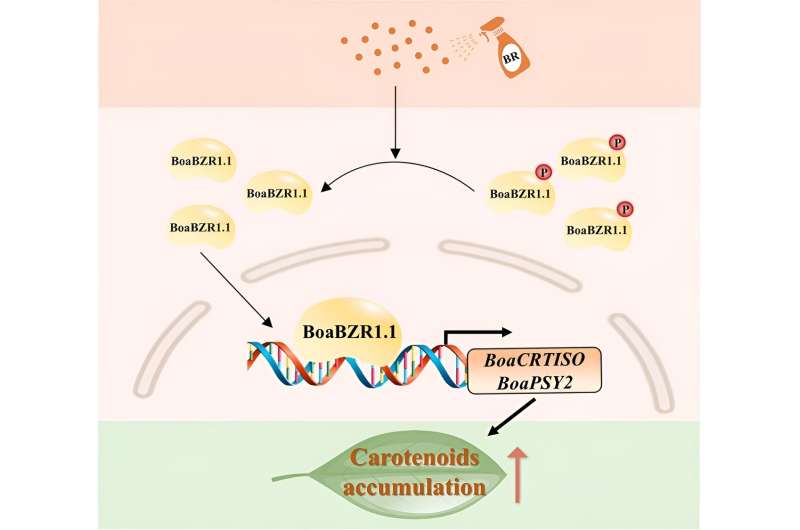This article has been reviewed according to Science X's editorial process and policies. Editors have highlighted the following attributes while ensuring the content's credibility:
fact-checked
peer-reviewed publication
proofread
From kale to carotenoid powerhouse: Advances in plant nutrition

Carotenoids, vital antioxidants in plants, are integral for human health, enhancing immunity and preventing diseases. However, many vegetables, including Chinese kale, naturally exhibit low carotenoid levels.
To address this nutritional gap, scientists are exploring genetic pathways to increase these beneficial compounds in crops, aiming to improve their health benefits significantly. This approach leverages advanced genetic techniques to potentially enrich the dietary value of commonly consumed vegetables.
Published in Horticulture Research in April 2024, the study by Sichuan Agricultural University highlights the pivotal role of the BoaBZR1.1 gene in enhancing carotenoid biosynthesis in Chinese kale. This research pinpoints a key genetic target for augmenting vegetable nutritional qualities, providing valuable insights into the potential of genetic engineering to increase essential nutrients.
The study centered on BoaBZR1.1, a transcription factor in the brassinosteroid signaling pathway essential for plant growth and stress responses. Activation of BoaBZR1.1 led to a substantial increase in carotenoid biosynthesis gene expression, boosting both carotenoid and chlorophyll levels. This genetic enhancement not only raised the nutritional value but also enhanced the visual appeal of Chinese kale.
The findings demonstrate an effective strategy to enhance the nutritional profiles of vegetables via targeted genetic engineering, potentially applicable to a wide range of crops. This approach marks a significant progression in agricultural biotechnology for improving dietary health.
Genetic engineering holds remarkable potential for overcoming dietary deficiencies," remarked Dr. Yi Tang, a study co-author and noted horticulturist. "This study illustrates how leveraging plant natural mechanisms can produce crops that are not only more nutritious but also more adaptable to environmental challenges."
The implications of this study extend beyond improving Chinese kale, offering prospects for enhancing other crops to address global nutritional deficits and support food security.
This research paves the way for a future where crops are optimized for health benefits, potentially transforming global dietary patterns and contributing to sustainable agriculture.
More information: Chenlu Zhang et al, BoaBZR1.1 mediates brassinosteroid-induced carotenoid biosynthesis in Chinese kale, Horticulture Research (2024). DOI: 10.1093/hr/uhae104
Journal information: Horticulture Research
Provided by TranSpread





















